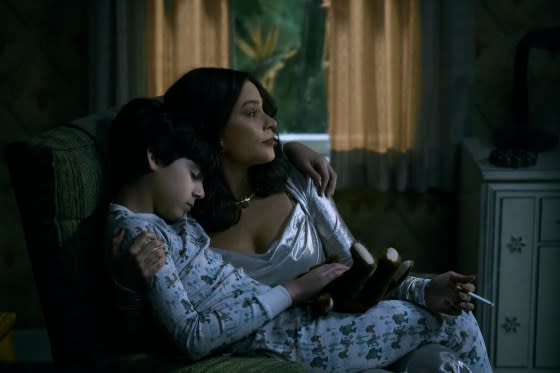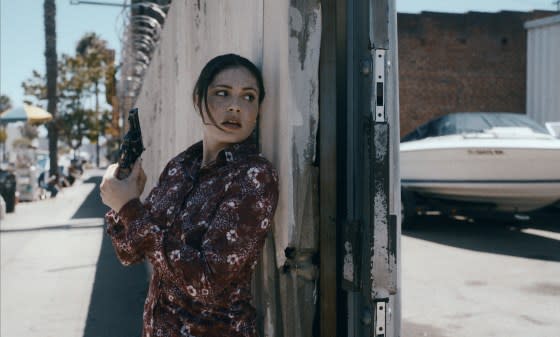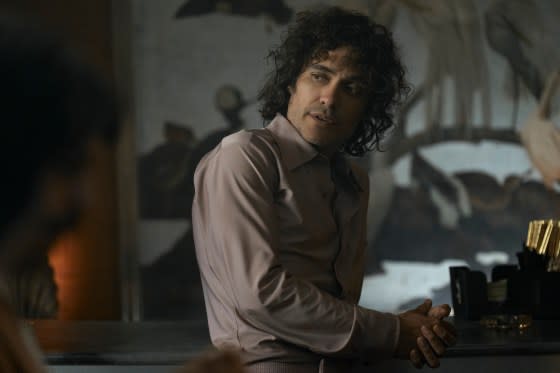Netflix's Formulaic Griselda Casts Sofia Vergara as a Girlboss Scarface
In an early episode of Netflix’s Griselda, a detective is interviewing a waitress about a deadly shootout at her workplace. Though she’s reticent at first, she eventually reveals that, surprisingly, one of the three people she saw entering the restaurant’s backroom that night was a woman. “A girlfriend,” the male detective concludes. But his female colleague, who has been acting as a translator, walks the waitress out of the station and coaxes her into saying more. “She didn’t walk like a woman who’s a girlfriend,” she confides. She looked “like a boss.”
The authoritative figure they’re discussing is Griselda Blanco, the real-life cocaine queenpin whose reign this fast-paced but formulaic six-part drama, debuting Jan. 25, chronicles. In a striking departure from the lighthearted Modern Family performance that made her famous, Sofia Vergara steps into the title role of a woman who briefly conquers the ultimate male-dominated field. The real Blanco was evidently a singular personality. But despite Vergara’s estimable efforts to give the character depth, Griselda is a disappointingly predictable rise-and-fall narrative that flattens her into little more than Scarface with a girlboss makeover.
Created by Narcos and Narcos: Mexico showrunner Eric Newman, with Doug Miro, Ingrid Escajeda, and Carlo Bernard, the series opens in Griselda’s home country of Colombia at the most desperate moment of a criminal career that spanned from the mid-’60s to Blanco’s arrest in 1985. With a decade of experience trafficking drugs alongside her husband Alberto (played by Alberto Ammann) under her belt, she’s forced to flee Medellin with her three sons after Alberto’s humiliating scheme to pimp her out to his loathsome brother in return for paying the couple’s debts ends in violence. Her destination: disco-era Miami. Griselda promises her host, Carmen (Vanessa Ferlito), an old cohort who’s now a travel agent, that she’s going straight.

What she doesn’t mention is the kilo of coke she smuggled into the U.S. in one of the boys’ suitcases. Despite her insistence that she intends to quickly offload the drugs and use the proceeds to start a normal life with her kids, it’s immediately apparent that she’ll never be satisfied answering phones at Carmen’s front desk. Sure enough, her surprisingly difficult quest to sell the kilo soon leads her to the heart of Miami’s criminal underworld. Demeaned, dismissed, and often physically attacked because she’s a woman—and in this telling a remarkably beautiful one, though Vergara bears little resemblance to the real Blanco—Griselda grows ever more determined to not only rule the city’s cocaine trade, but also to make the men who mistreated her pay. She succeeds, for a while, through a combination of swagger, brutality, and the fierce loyalty she inspires in an army of Cuban refugees and former sex workers who connect with her self-mythologizing image as a champion of the downtrodden.
You don’t have to read up on Blanco’s fate to predict where Griselda goes from there; you merely need to have seen, oh, any sub-Sopranos gangster entertainment on the big or small screen. On the case from the moment the waitress describes the boss-like woman in the restaurant, the translator, a razor-sharp Miami PD intelligence analyst named June Hawkins (Juliana Aidén Martinez), becomes the first and, for a long time, only person in law enforcement to pursue Griselda. Also a mother, and also a hyper-competent woman marginalized by her macho colleagues, June is here to mirror Griselda, playing cat to her mouse. She’s also, I suspect, Newman’s way of defusing criticisms Narcos faced for depicting Latin American characters—who remain underrepresented on TV in the U.S.—as bloodthirsty criminals.

The approach might’ve been more convincing if we ever got a sense of who June is, beyond the various professional and personal hats she wears. Griselda’s sons, lieutenants, and lovers are just as broadly sketched. The one thing we learn about her would-be assassin turned employee turned husband, Dario Sepúlveda (Alberto Guerra), is that he’s sensitive enough to dread killing children. Griselda’s relationship with her right-hand man Rivi Ayala (Martín Rodríguez), a thug who has a spiritual awakening of sorts after discovering hallucinogens and speaks in mystical koans, could’ve been fascinating if the show had invested more time in exploring it.
Most dissatisfying of all is Griselda’s own opacity. A docudrama about an outlier of Blanco’s magnitude should paint a compelling—and, crucially, specific—portrait of that protagonist. Instead, the series combines two stock characters: the gangster propelled, then doomed, by their own inflated ego and the girlboss obsessed with proving she can do anything boys can do, backwards and in skintight gold lamé. The writers really, exhaustingly, hammer home the feminist subtext. Griselda keeps saying things like, “Every room I walk into, I’m just a woman,” as though we might forget her plight. Someone is always calling her a housewife, a whore, or that Strong Female Character chestnut, a “badass.” Vergara nails the emotional aspects of her arc, using her face and body to convey subtle shifts in Griselda’s confidence level, guilt over the truly horrible deeds she’s ordered, and, ultimately, self-destructive, coke-fueled paranoia. But the script never gives us a sense of why she’s making the often-baffling decisions she makes.

And so a true story with the potential to fuel a unique character study becomes, instead, typical gangster pulp in bloody-stiletto drag, capped off with a hasty, Wikipedia-summary denouement. If the popularity of Narcos and its ilk is any indication, the result will likely satisfy plenty of viewers. It helps that, from a technical standpoint, from refreshingly naturalistic performances to efficient editing to costumes and production design that vividly evoke Miami in the late ’70s and early ’80s, Griselda gleams. Yet without anything new to say, it seems doomed to end up just another fleeting Netflix hit, binged in a weekend and forgotten within a month of its release.
“I don’t even know why I did all of this,” Griselda laments, late in the series, after a disastrous party. “Why I killed those people.” Neither do viewers. And as she finally asks herself what the point of all that carnage was, you might begin to wonder why you stuck around to watch it.
Contact us at letters@time.com.

 Yahoo Lifestyle
Yahoo Lifestyle 